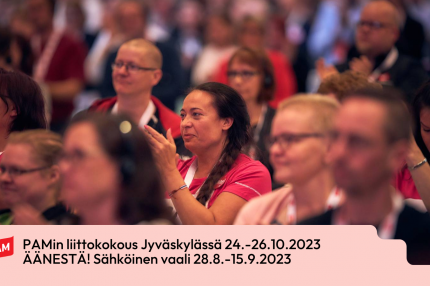Labour legislation
Work shouldn’t be voluntary if it’s for a commercial operation
In Jaana Paanetoja’s opinion, public authorities, for example municipalities, should not assist events unless they are sure of the true nature of the work being done. Photo: Jukka Rapo
Summer festivals involve a lot of voluntary work. According to Dr. Jaana Paanetoja, assistant professor of employment and social law, there is a problem if the work actually constitutes an employment relationship.
A few decades ago the majority of summer festivals in Finland were organised by enthusiasts for fun for themselves and others. Now the whole thing has got more professional and business operators have moved in. But voluntary work is still done everywhere. But is it voluntary work?
“In practice all the protection people enjoy under employment law in Finland comes from there being an employment relationship. Voluntary work is excluded from this. It’s problematic if there’s no recognition of an employment relationship,” says Dr. Jaana Paanetoja, assistant professor of employment and social law.
She recently published an article on voluntary work on Edilex that looked in particular at music festivals. She has also examined the subject in an expert opinion requested by PAM.
There is a long list of employment laws. They regulate employment contracts, working time, compensation for accidents at work, occupational safety, occupational healthcare, annual holidays, gender equality and equal treatment. Application of the provisions of collective agreements also presupposes an employment relationship.
Indeed the biggest risks in voluntary work have to do with work safety and accidents. For example, compulsory insurance for accidents is based on an employment relationship. This is different from insurance taken out voluntarily.
“The amount of compensation is important. For example in traditional voluntary work insurance policies the compensation amounts are extremely small. Compensation of a few thousand is very little if someone gets a permanent disability”, Paanetoja says.
Indicators of an employment relationship are: doing work for someone else, based on a contract, in person, under management and supervision, for remuneration. Most discussion has centred around whether festival tickets given to volunteers are remuneration for work.
“Very often voluntary work application forms state that do this much work and in return you’ll get a ticket for the festival”, Paanetoja says.
It has been thought that voluntary work is done in the joint interest of the organiser and the worker. It’s called helping out neighbours, groups of friends, or associations.
“There has never been voluntary work that is outside of employment legislation, and it can’t be done for a profit-making business. What would be the shared philosophical or ideological interest uniting the company and the worker?”, Paanetoja asks.
In recent years it has been common for companies to have work done under the heading of volunteering.”
Paanetoja would like to see a debate in society on voluntary work. Legislation hardly needs changing. It’s about practicalities and identifying issues.





